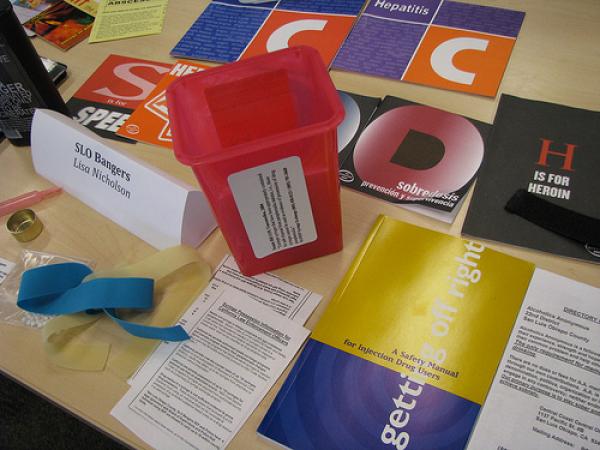

Literature handed out at a needle exchange programme. By Robert E. Kennedy Library at Cal Poly (CC BY-NC 2.0)
9 September 2013
Drug abuse harms the individual, their family, community and country. As the drug trade increased globally, to save people from themselves, in 1970, US president Richard Nixon launched the “war on drugs”.
As with the US prohibition experiment from 1919 to 1933, which banned the sale, production, and transportation of alcohol, the unintended consequences of the criminalisation of the use of drugs has resulted in a failed policy. Drug abuse is bad, but drug prohibition is worse.
To wage war, there needs to be enemies. In the case of drugs, these are dealers and also users. Users may include family, friends and other ordinary members of society. Users have swelled the prison population in South Africa. In the US however, this has reached preposterous proportions; 5% of the world’s population has 25% of the prison population, much of it drug related. South Africa cannot be proud of its prison statistics, but it has proportionately less than half that of the US. People sentenced to prison have a much higher chance of graduating to a life of crime as their criminal record magnifies the difficulty of finding employment.
Drug prohibition leads to the corruption of the political, policing and judicial systems. The profits are so large that in Mexico, which is a conduit for drugs destined for the US, the fight for turf by drug cartels has been responsible for over 70 000 murders and 20 000 disappearances during former Mexican President Felipe Calderon’s six years in office. Drugs create crime. People who become addicted to substances often cannot fund the high prices of illicit products and turn to drug running, robbery and other criminal methods to meet their needs.
If one believes that taking drugs is evil, the response is that the war on drugs should be pursued with renewed vigour and resources. However, this view is blind to the realities of a relentless global increase in the drug trade, and the growing power of criminal drug suppliers despite, if not because of the war on drugs. It is time to consider alternatives.
History and experience show that society has always and will always have psychoactive substances. We should acknowledge this and develop better ways of dealing with human frailty.
An evidence-based approach rather than the present arbitrary classification of drugs is required. Alcohol and tobacco, both legalised drugs, are more harmful than cannabis, which even has useful medical properties. Therefore it makes no sense that they are legalised while cannabis is criminalised. There is also no clear distinction between socially acceptable and illicit substances.
Addiction can have devastating consequences. But addiction comes in many forms, such as drugs, gambling, sex, and food. The victims require help and understanding. Severe punitive measures and stigmatization make rehabilitation more difficult. People who take drugs may be unwise but are not and should not be branded as criminals.
Prohibition (criminalisation) of drugs puts their control in the hands of the drug dealers. Escalating the war makes drugs more valuable and attracts more participants to the illicit industry.
Opponents of decriminalisation claim that tolerating the use of drugs will open the floodgates of abuse. The evidence suggests the opposite.
Twelve years ago the most important problem in Portugal was the use of drugs. It took the brave step of decriminalising. Statistics have now shown that drug use has decreased, especially in comparison to the rest of the EU. Drug use by school children has declined; imprisonment of drug users has ceased (they are treated socially and not criminally); and there has been a reduction in drug trade. Drug use is now sixth on their list of problems.
The Dutch model of ‘coffee shops’ where cannabis could be obtained legally was introduced to protect cannabis users from exposure to harder drugs. Indeed it found that drug users were much less likely to buy harder drugs from their cannabis sources. Substantial tax revenues also flowed into state coffers rather than into the pockets of criminal drug traders. Access to a commercial market for cannabis did not result in a prolific growth of cannabis consumers. On the contrary, cannabis use stayed on par with European averages and remains far lower than in stricter environments like the United States.
Heroin ranks as the most dangerous drug, with high addiction rates, hospitalisation due to diseases, and deaths caused by overdose or impurities added by unscrupulous dealers. It is often given intravenously, and addicts reuse and share needles, exposing them to hepatitis and HIV. In Switzerland and elsewhere where heroin addicts are supplied with clean drugs and needles, there has been a dramatic drop in hospitalisation costs, drug deaths and petty crimes.
Our government should urgently formulate and implement an evidence-based drug policy that draws on the experiences of other countries around decriminalising drug use; takes into account the levels of harm of different drugs; and adopts a rights-based public health approach to policy (rather than a criminal, punitive approach).
The difficulty in achieving this should not be underestimated. There are considerable vested interests in the drug war economy; those that trade the drugs and those that oppose them (the policing, judicial and prison systems). The lifting of the prohibition of alcohol in the US was opposed by the traders and the religious conservatives leading to the expression ‘the Bootleggers and the Baptists’ - an example of a model of politics in which the opposite moral positions lead to the same vote. Visionary political leadership is needed.
Professor Van Niekerk is an Emeritus Professor at UCT, former Dean UCT Faculty of Health Sciences and former Managing Editor of the SA Medical Journal. He is currently Consulting Editor of the South African Medical Journal.